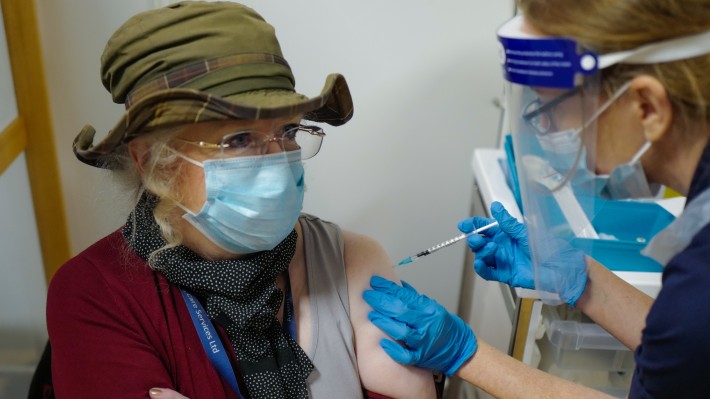Coronavirus: richest countries ‘hoarding’ Covid vaccines from world’s poorest, watchdog says
67 developing nations can hope to vaccinate ‘just one in ten people’ by the end of next year

A free daily email with the biggest news stories of the day – and the best features from TheWeek.com
You are now subscribed
Your newsletter sign-up was successful
Many of the world’s poorest nations will be forced to go without Covid-19 vaccines as richer countries are hoarding enough doses to immunise their populations three times over, an international vaccine watchdog has claimed.
The People’s Vaccine Alliance, a coalition campaigning for universal access to the jabs, said that “in nearly 70 of the poorest nations, only one in ten people can hope to get a vaccine by the end of next year”, The Times reports. Five of the 67 nations - Kenya, Myanmar, Nigeria, Pakistan and Ukraine - have reported nearly 1.5 million cases between them.
Shortages are being caused by the world’s developed nations, which represent just 14% of the population, buying up “more than half of the most promising vaccines”, the paper adds.
The Week
Escape your echo chamber. Get the facts behind the news, plus analysis from multiple perspectives.

Sign up for The Week's Free Newsletters
From our morning news briefing to a weekly Good News Newsletter, get the best of The Week delivered directly to your inbox.
From our morning news briefing to a weekly Good News Newsletter, get the best of The Week delivered directly to your inbox.
The campaign, which includes Oxfam and Amnesty International, found that “all doses of the Moderna vaccine have been bought by rich countries, as have 96% of Pfizer’s doses”, Sky News says. Canada was singled out as having bought enough vaccines to give the jab to every citizen five times.
Promising results from the Oxford-AstraZeneca vaccine, which will be provided to low- and middle-income countries at not-for-profit prices “in perpetuity”, had been hoped to be a potential fix to vaccine hoarding.
But the campaign said that “even a promise from those behind the vaccine to allocate 64% of doses to people in developing nations may not be enough”, Sky News adds.
“The hoarding of vaccines actively undermines global efforts to ensure that everyone, everywhere can be protected from Covid-19,” said Steve Cockburn, head of economic and social justice at Amnesty International.
A free daily email with the biggest news stories of the day – and the best features from TheWeek.com
“By buying up the vast majority of the world’s vaccine supply, rich countries are in breach of their human rights obligations.”
Joe Evans is the world news editor at TheWeek.co.uk. He joined the team in 2019 and held roles including deputy news editor and acting news editor before moving into his current position in early 2021. He is a regular panellist on The Week Unwrapped podcast, discussing politics and foreign affairs.
Before joining The Week, he worked as a freelance journalist covering the UK and Ireland for German newspapers and magazines. A series of features on Brexit and the Irish border got him nominated for the Hostwriter Prize in 2019. Prior to settling down in London, he lived and worked in Cambodia, where he ran communications for a non-governmental organisation and worked as a journalist covering Southeast Asia. He has a master’s degree in journalism from City, University of London, and before that studied English Literature at the University of Manchester.
-
 The environmental cost of GLP-1s
The environmental cost of GLP-1sThe explainer Producing the drugs is a dirty process
-
 Greenland’s capital becomes ground zero for the country’s diplomatic straits
Greenland’s capital becomes ground zero for the country’s diplomatic straitsIN THE SPOTLIGHT A flurry of new consular activity in Nuuk shows how important Greenland has become to Europeans’ anxiety about American imperialism
-
 ‘This is something that happens all too often’
‘This is something that happens all too often’Instant Opinion Opinion, comment and editorials of the day
-
 Epstein files topple law CEO, roil UK government
Epstein files topple law CEO, roil UK governmentSpeed Read Peter Mandelson, Britain’s former ambassador to the US, is caught up in the scandal
-
 Iran and US prepare to meet after skirmishes
Iran and US prepare to meet after skirmishesSpeed Read The incident comes amid heightened tensions in the Middle East
-
 Israel retrieves final hostage’s body from Gaza
Israel retrieves final hostage’s body from GazaSpeed Read The 24-year-old police officer was killed during the initial Hamas attack
-
 China’s Xi targets top general in growing purge
China’s Xi targets top general in growing purgeSpeed Read Zhang Youxia is being investigated over ‘grave violations’ of the law
-
 Panama and Canada are negotiating over a crucial copper mine
Panama and Canada are negotiating over a crucial copper mineIn the Spotlight Panama is set to make a final decision on the mine this summer
-
 Why Greenland’s natural resources are nearly impossible to mine
Why Greenland’s natural resources are nearly impossible to mineThe Explainer The country’s natural landscape makes the task extremely difficult
-
 Iran cuts internet as protests escalate
Iran cuts internet as protests escalateSpeed Reada Government buildings across the country have been set on fire
-
 US nabs ‘shadow’ tanker claimed by Russia
US nabs ‘shadow’ tanker claimed by RussiaSpeed Read The ship was one of two vessels seized by the US military